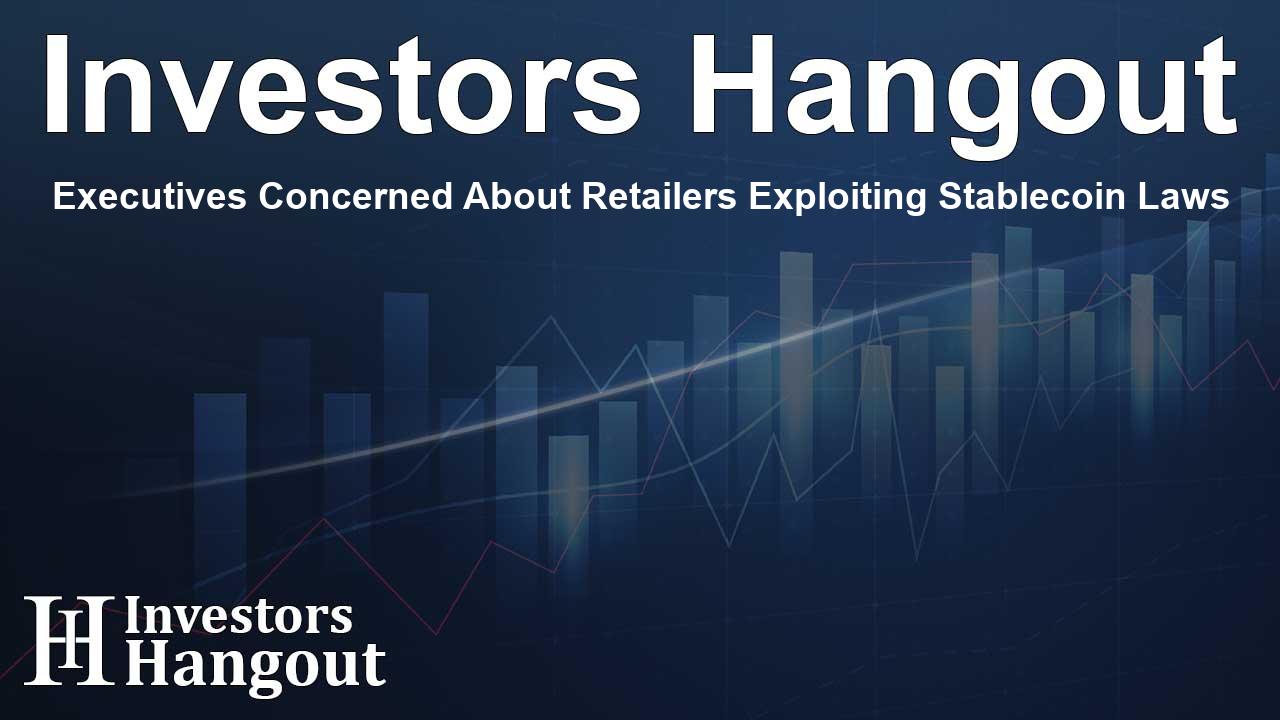Executives Concerned About Retailers Exploiting Stablecoin Laws

Bankers Express Concerns Over Loopholes in New Stablecoin Legislation
In recent surveys conducted by fintech IntraFi, bank executives have voiced significant concerns regarding the potential for large corporations like Amazon and Walmart to chart paths around the new stablecoin regulations set forth by the Guiding and Establishing National Innovation for U.S. Stablecoins Act, otherwise known as the GENIUS Act.
The GENIUS Act and Its Implications
Enacted to create a structured framework for U.S. stablecoins, the GENIUS Act prohibits any interest payments on these digital currencies or financial incentives aimed at increasing user adoption. Despite these intentions, industry insiders illustrate a widespread fear that compliance will not curb major retailers and tech giants from discovering ways to offer yield-bearing stablecoins, creating a competitive landscape for traditional banking institutions.
Survey Insights on Banking Executives’ Perspectives
The survey revealed that an overwhelming 96% of bank executives remain skeptical regarding the effectiveness of the GENIUS Act in preventing nonbank corporations from providing yield opportunities. Mark Jacobsen, Cofounder and CEO of IntraFi, highlighted that while the genesis of the legislation aims for positive outcomes, substantial doubts linger about its impact on banking sectors. The threat of enhanced competition from these corporations looms large, potentially undermining banks’ deposit bases.
Banking Trends and Future Expectations
Despite major financial institutions such as J.P. Morgan Chase and Goldman Sachs eagerly exploring the stablecoin landscape, the survey indicated that a considerable majority, about 52%, of bank leaders do not have immediate plans to introduce similar products. The quarter's survey also unveiled rising alarm over fraud issues, especially those concerning fraudulent checks. A staggering 82% of executives encountered obstacles, such as cooperation delays from the originating bank when confronting fraud cases.
Fraud and Regulatory Clarity Concerns
Delays in resolving fraud disputes aren't the only challenge; 68% of respondents indicated they struggle with securing reimbursements from the primary deposit banks. Moreover, a notable 60% admitted that their banks often compensate customers even when there is no legal obligation to do so. To address these pressing concerns, 82% of bankers advocated for new regulations that clearly define banks' reimbursement responsibilities in instances of fraud. Besides, more than 70% of respondents supported improved collaboration and information sharing among banks as a strategy to better combat fraud.
Key Highlights from the Survey
- Loan Demand: 45% of bankers predict an uptick in loan demand over the next year, a rise from 39% in the last quarter.
- Funding Costs: A substantial 62% anticipate a decline in funding costs in the upcoming year, although uncertainty still clouds forecasts for Federal Reserve interest rate adjustments.
- Deposit Competition: An impressive 93% foresee competition for deposits to either stabilize or increase, marking the highest anticipation since the third quarter of 2023.
- Access to Capital: 73% of those surveyed expect stable access to capital, continuing a positive long-term trend.
- Economic Outlook: 29% of participants remain optimistic about improving economic conditions over the next year.
Understanding IntraFi
IntraFi, a key player in the financial landscape, has been a trusted partner for over 3,000 financial institutions for more than two decades. The firm emphasizes the importance of fostering stronger relationships with customers, facilitating additional loan funding, managing liquidity efficiently, and generating steady fee income. Their extensive network provides financial institutions access to significant funding amounts while ensuring a secure environment for handling large deposits.
Frequently Asked Questions
What is the GENIUS Act?
The GENIUS Act is legislation designed to regulate U.S. stablecoins, specifically preventing them from offering interest payments or financial incentives.
What major concerns do bankers have about the GENIUS Act?
Bankers fear that large retailers may find loopholes, allowing them to offer yield-bearing stablecoins, thereby increasing competition for traditional banks.
How do fraud issues affect banking executives?
Executives report significant hurdles in resolving fraud disputes, including delays and difficulties in obtaining reimbursements from the bank of first deposit.
What percentage of bankers foresee increased loan demand?
45% of banking executives anticipate a stronger demand for loans over the next year.
How does IntraFi support financial institutions?
IntraFi provides a network that enhances customer relationships, facilitates liquidity management, and enables access to funding opportunities.
About The Author
Contact Henry Turner privately here. Or send an email with ATTN: Henry Turner as the subject to contact@investorshangout.com.
About Investors Hangout
Investors Hangout is a leading online stock forum for financial discussion and learning, offering a wide range of free tools and resources. It draws in traders of all levels, who exchange market knowledge, investigate trading tactics, and keep an eye on industry developments in real time. Featuring financial articles, stock message boards, quotes, charts, company profiles, and live news updates. Through cooperative learning and a wealth of informational resources, it helps users from novices creating their first portfolios to experts honing their techniques. Join Investors Hangout today: https://investorshangout.com/
The content of this article is based on factual, publicly available information and does not represent legal, financial, or investment advice. Investors Hangout does not offer financial advice, and the author is not a licensed financial advisor. Consult a qualified advisor before making any financial or investment decisions based on this article. This article should not be considered advice to purchase, sell, or hold any securities or other investments. If any of the material provided here is inaccurate, please contact us for corrections.
